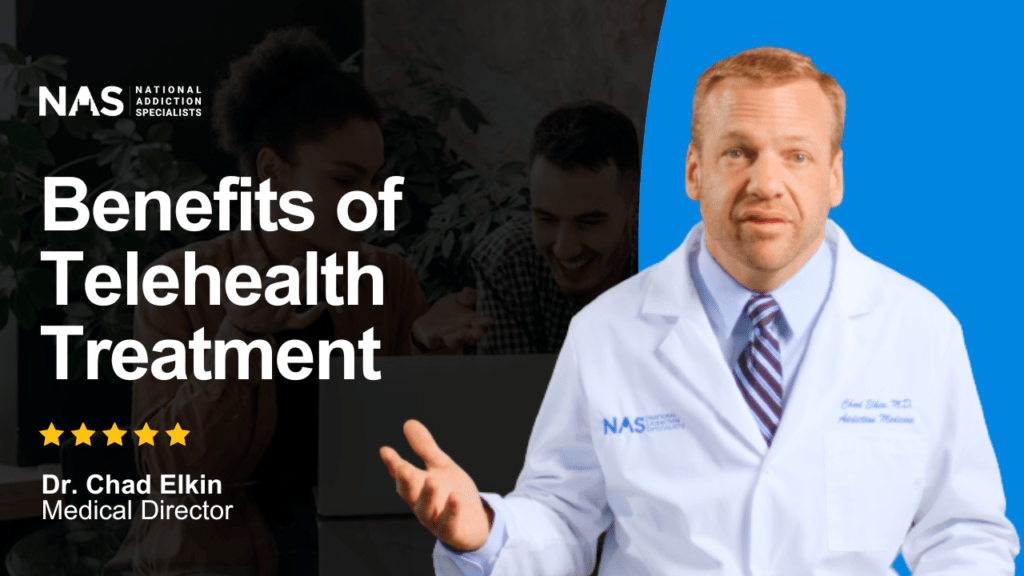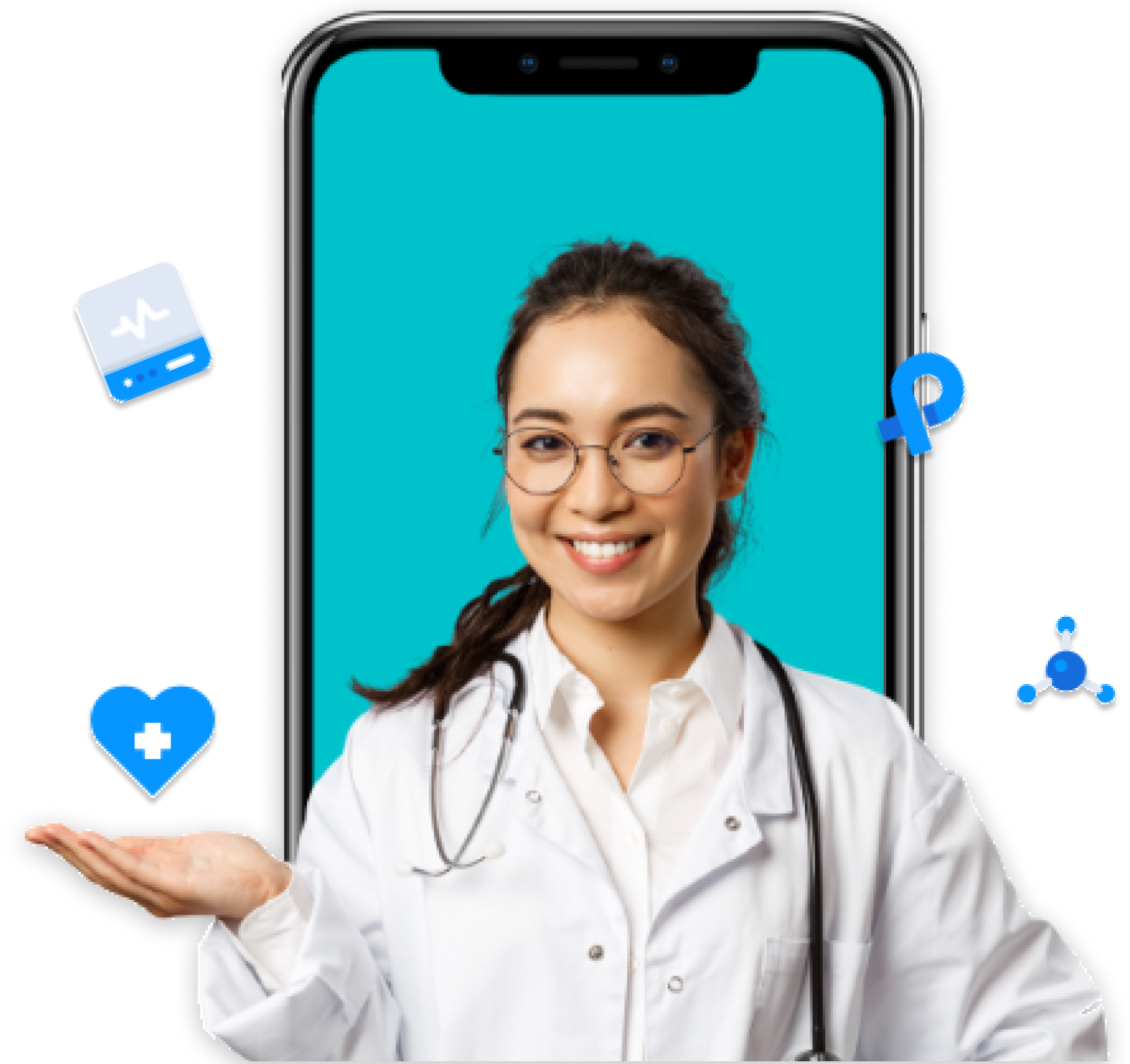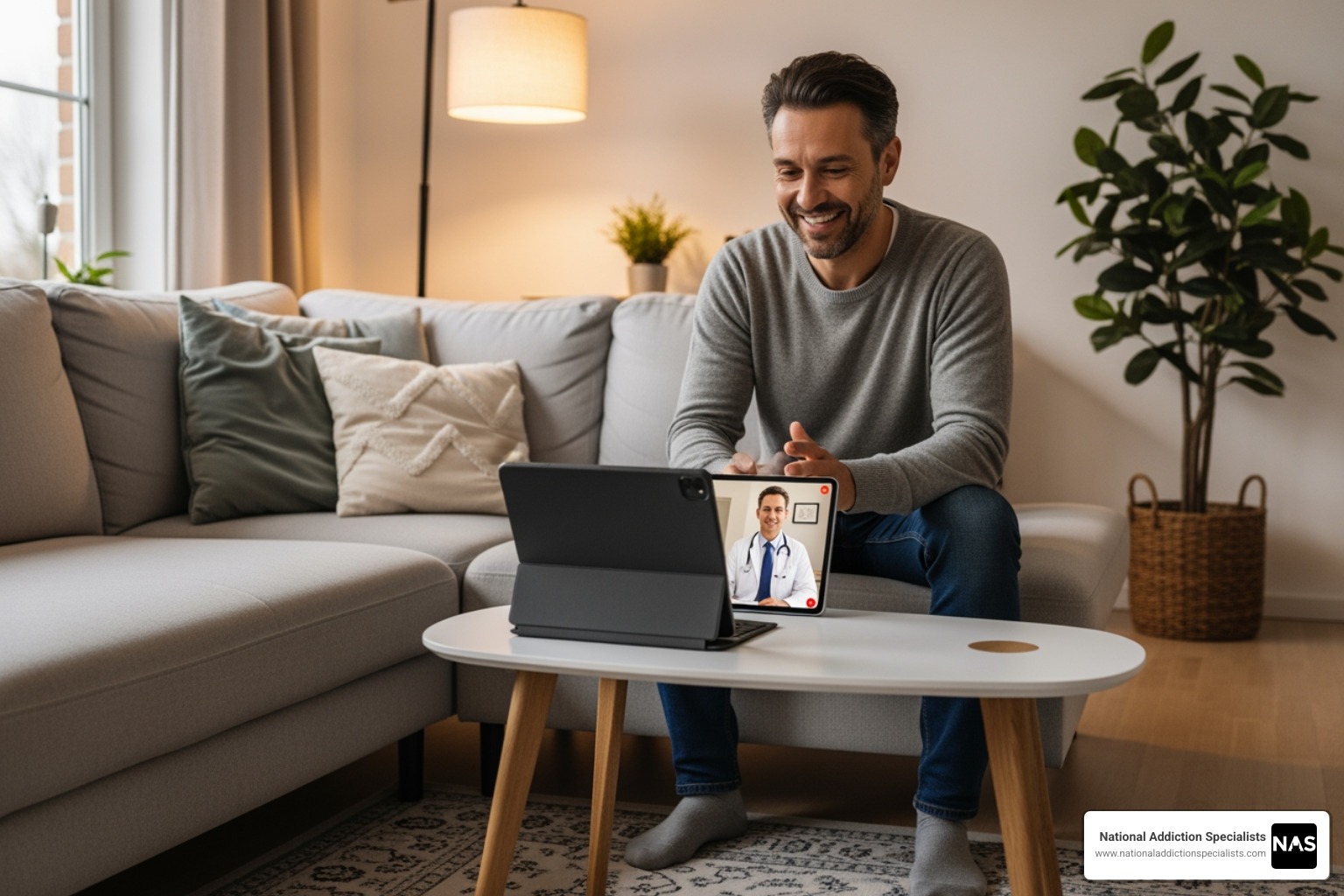Why Online Recovery Coaching is Changing Addiction Treatment
Online recovery coaching is a professional, collaborative relationship that provides personalized support for individuals in addiction recovery through digital platforms. Unlike traditional therapy or clinical treatment, recovery coaches focus on empowerment, accountability, and helping clients build the life they want in recovery.
What Online Recovery Coaching Offers:
- Non-clinical support that complements medical treatment
- Flexible scheduling that fits your daily routine
- Personalized guidance based on your unique recovery goals
- Accountability partnerships to keep you motivated
- Crisis management and relapse prevention strategies
- Family support and relationship rebuilding
Recovery coaching goes beyond just staying clean. As one recovery expert explains, “A recovery coach’s job is to help you design a pathway to living a rich, full, meaningful life – a life worth living.” This approach recognizes that true recovery means more than abstinence—it’s about creating sustainable change and building what professionals call “recovery capital.”
The numbers speak for themselves. Research shows that individuals who participate in recovery monitoring programs achieve an 82% abstinence rate, compared to much lower rates for those without ongoing support. This dramatic improvement highlights why recovery coaching has become such a vital part of comprehensive addiction treatment.
Online recovery coaching makes this support more accessible than ever before. You can connect with qualified coaches from the privacy of your home, eliminating barriers like transportation, scheduling conflicts, and concerns about stigma that might prevent you from seeking help.
I’m Dr. Chad Elkin, a board-certified addiction medicine physician and founder of National Addiction Specialists. Through my work with thousands of patients, I’ve seen how online recovery coaching bridges the crucial gap between clinical treatment and real-world recovery, providing the ongoing support that makes long-term success possible. This comprehensive approach helps patients apply the skills they learn in treatment to their daily lives, creating lasting change.
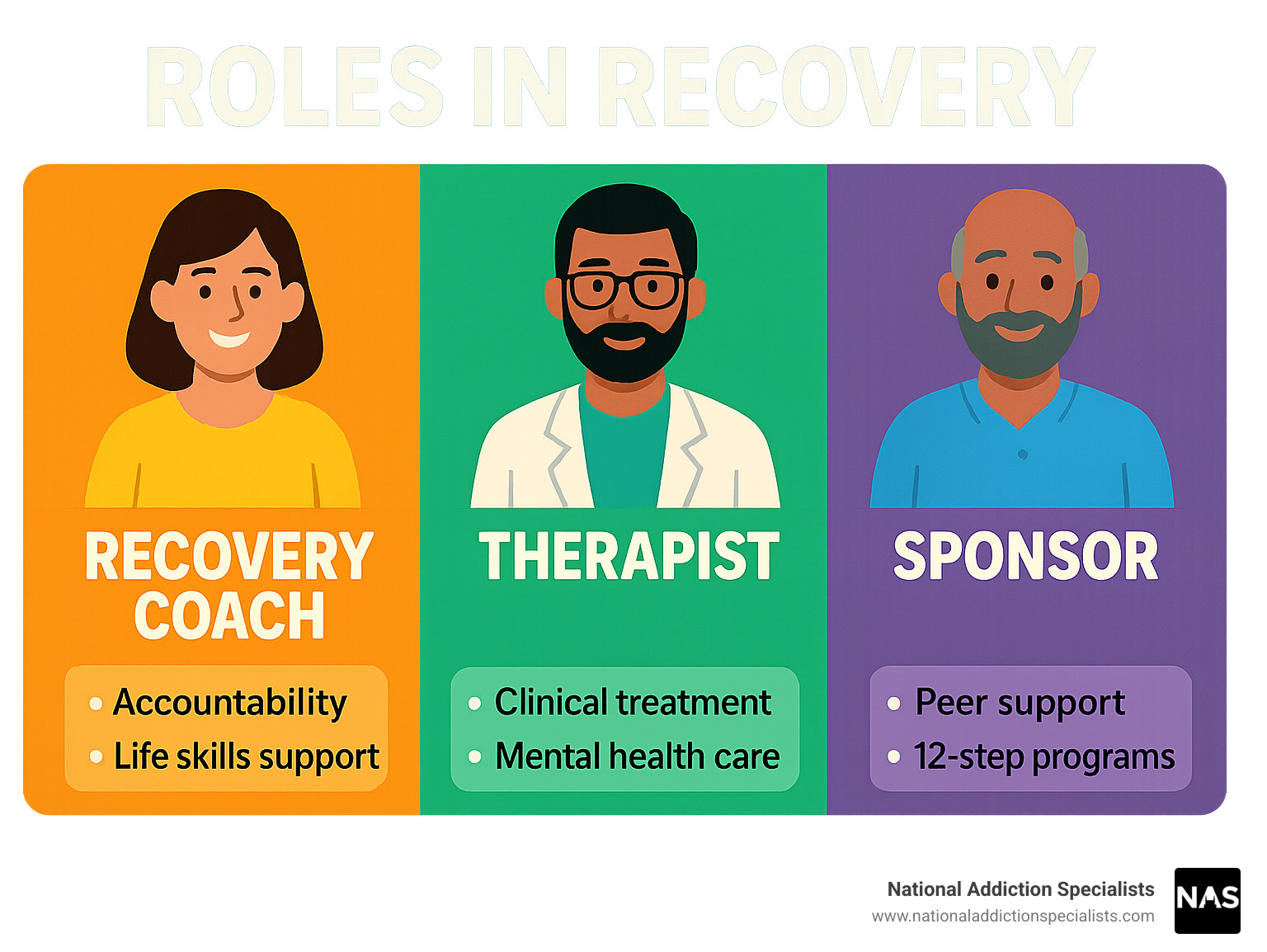
Understanding Online Recovery Coaching: A Modern Approach to Support
Recovery is a journey, not a destination. It requires ongoing, non-clinical support alongside medical care to steer the ups and downs. While a doctor heals your body and a therapist helps process emotions, a recovery coach helps you build the life you want to live.
Recovery coaching uses a strengths-based approach, focusing on what’s working in your life. It’s a partnership where you are a person with goals being supported, not a patient being treated. Many coaches also bring valuable lived experience, having walked a similar path themselves. This shared understanding creates a powerful bond.
For more comprehensive support options, you can learn about our online addiction counseling services.
The Role of a Recovery Coach in Your Journey
Think of your recovery coach as a personal cheerleader and strategic partner. They help you figure out what you want and support you in making it happen.
- Accountability Partner: They provide gentle, consistent check-ins to help you show up for yourself, not out of judgment, but from a belief in your success.
- Motivator and Guide: Your coach helps you create a customized Personal Recovery Action Plan, focusing on self-care, building a support team, developing new skills, and living a recovery-focused lifestyle.
- Resource Connector: They know the recovery landscape and can point you to peer groups, educational opportunities, or other services that fit your needs.
- Problem-Solving Partner: Coaches help you handle stress, identify triggers, and develop coping strategies for daily challenges.
- Recovery Capital Builder: They help you build the resources and strengths needed to maintain long-term recovery, which research shows dramatically improves success rates.
For more strategies on building a strong foundation, explore our guide to addiction recovery strategies.
How is it Different from In-Person Coaching?
While the core principles are the same, online recovery coaching offers distinct advantages:
- Accessibility and Convenience: Connect from anywhere, eliminating travel time and logistical hassles. This makes getting consistent support much easier.
- Flexible Scheduling: Online platforms make it easier to find coaches who offer sessions that fit your unique schedule, including early mornings, late evenings, or weekends.
- Wider Choice of Coaches: You aren’t limited by geography, so you can find a coach whose personality, experience, and approach are the perfect match for you.
- Continuous Communication: Support extends beyond video calls with secure messaging, email, and texts for quick check-ins and encouragement between sessions.
- Anonymity and Comfort: Being in your own familiar, private space can make it easier to open up and reduces concerns about stigma.
The Key Advantages of Virtual Recovery Support
The digital revolution has transformed recovery support, making it more accessible than ever. Online recovery coaching breaks down traditional barriers, creating new opportunities for healing.
- Overcoming Geographical Barriers: Whether you’re in rural Tennessee or a busy Virginia suburb, expert support is just a click away. No more long drives or worrying about who might see you in a waiting room.
- Reduced Stigma and Increased Comfort: Many people feel more comfortable opening up from the safety of their own home. This privacy can lead to deeper, more honest conversations that accelerate healing.
- Easier Integration into Daily Life: Recovery happens in the real world, not in isolation. Your coach becomes part of your routine, available for a quick check-in during a tough day at work or a stressful family situation.
- A Consistent Support System: Having someone consistently in your corner, celebrating wins and navigating setbacks, is incredibly powerful. This ongoing support helps you feel less alone on your journey.
The Role of Technology in Effective Coaching
Technology is what makes online coaching so effective and accessible.
- Video Conferencing: Allows for genuine, face-to-face connections where a coach can read body language and provide personal support despite physical distance.
- Secure Messaging Apps: These are lifelines for quick encouragement or questions between sessions, preventing small challenges from becoming bigger problems.
- Mobile Recovery Apps: Many programs use apps to help you track progress, reduce relapse risk, and access support instantly, like a recovery toolkit in your pocket.
- Scheduling Tools: Easily book, reschedule, or adjust appointments online, putting you in control and removing barriers to consistent care.
- Online Support Groups: These digital gatherings connect you with peers who understand your journey, extending your support network.
For more insights into how technology is changing healthcare delivery, explore our comprehensive guide on telemedicine treatment.
What to Expect from Online Recovery Coaching
Starting online coaching is a collaborative process. While every relationship is unique, here are some common elements:
- One-on-One Video Sessions: Your journey centers around dedicated 30- to 60-minute sessions focused entirely on your goals and challenges.
- Goal Setting and Action Planning: Your coach helps you create a Personal Recovery Action Plan (PRAP) to turn hopes into concrete steps for building the life you want.
- Relapse Prevention Strategies: You’ll work together to identify personal triggers and develop practical coping strategies for high-risk situations.
- Support for Family Members: Many programs offer resources for loved ones to help them understand and support your recovery.
- Crisis Management: Coaches help you develop a personal crisis plan and connect you with resources, focusing on preparation and prevention.
- Skill-Building Exercises: You’ll learn practical tools for communication, emotional regulation, and problem-solving to handle life’s challenges with more confidence.
Make an Appointment to Treat Addiction
Please don’t hesitate. Make an appointment today.
Finding the Right Guide: What to Look for in an Online Recovery Coach

Finding the right online recovery coach is a critical step. It’s about more than credentials; it’s about finding someone who gets you and makes you feel heard.
Look for a personal connection where you feel comfortable being honest. Use initial consultation calls to trust your gut. Ensure you have shared values, as a good coach will honor your unique path to recovery. Finally, seek professionalism and clear boundaries. A professional coach is clear about their role, availability, and what they can and cannot provide, creating a safe and effective relationship.
Qualifications, Certifications, and Ethical Standards
While not clinical therapy, coaching requires expertise. The best coaches combine heart with proper training and ethical standards.
- Lived Experience: Many effective coaches have walked a similar path, offering a unique understanding that no textbook can teach.
- Formal Training: Look for coaches with training from recognized organizations like the Connecticut Community for Addiction Recovery (CCAR). Their Recovery Coach Academy teaches essential skills and ethics. You can Visit CCAR’s Website to learn more.
- Confidentiality: Your coach must maintain strict confidentiality, creating a safe space for you to share.
- Ethical Responsibilities: A coach should know their limits and when to refer you to clinical professionals, always prioritizing your well-being.
- Professional Credentials: Certifications from bodies like the International Coaching Federation (ICF) show a commitment to excellence. For more info on the ACC credential, you can explore their requirements.
Choosing the Right Online Recovery Coaching Program
Finding the right program is an investment in your success.
- Assess Your Needs: Are you in early recovery or further along? Match the program’s intensity to your current needs.
- Read Testimonials: Look for stories from clients that resonate with your own situation and goals.
- Use Consultation Calls: Interview several coaches. Ask about their approach and see if it feels like a good fit.
- Understand the Philosophy: Find a coach whose approach—whether focused on structure, spirituality, or something else—aligns with you.
- Consider the Program Structure: Look at session frequency, support between meetings, and package options to find what fits your lifestyle.
Navigating Costs and Payment Options
Cost is a real concern, but there are many options.
- Fees and Packages: Costs vary by experience. Many coaches offer package deals for multiple sessions at a discount.
- Sliding Scale Options: Don’t hesitate to ask about income-based pricing. Many coaches are willing to work with you.
- HSA/FSA: You can often use your Health Savings Account (HSA) or Flexible Spending Account (FSA) for coaching, as it may be an eligible medical expense. Check with your plan administrator.
- Insurance Coverage: While less common, it’s worth checking if your plan offers partial reimbursement for wellness services or out-of-network benefits.
The investment in coaching is often far less than the financial and personal cost of relapse. The right support is invaluable.
A Powerful Ally: How Coaching Complements Clinical Treatment
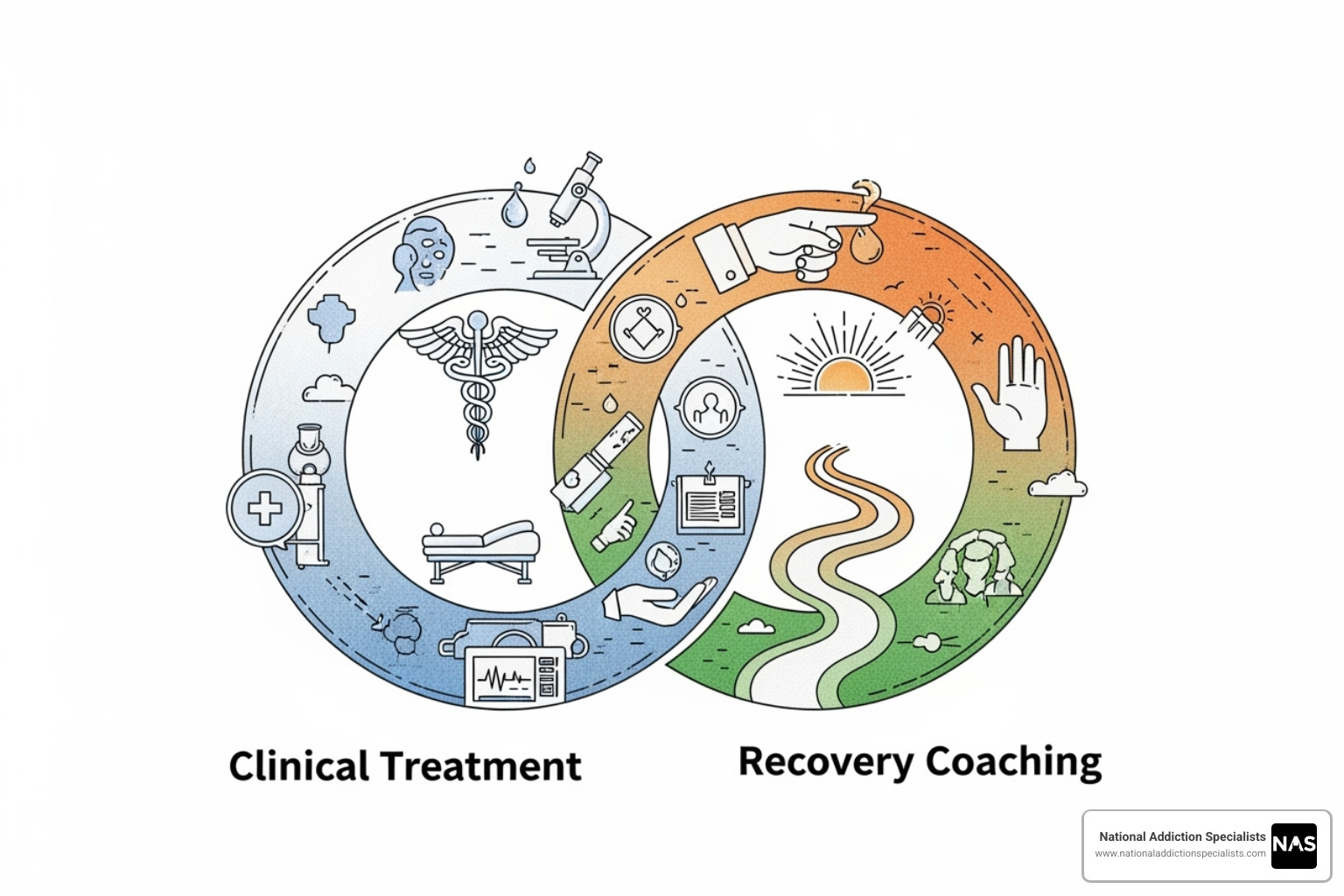
Here’s something I want you to understand: online recovery coaching isn’t trying to replace your doctor or therapist. Instead, think of it as the perfect teammate that makes everything else work better. At National Addiction Specialists, we see this partnership every day – clinical treatment and coaching working together like two pieces of a puzzle, each making the other stronger.
When you’re in clinical treatment, you learn incredible tools and strategies. You might work with a therapist to understand your triggers, or receive medication-assisted treatment to help manage cravings. But then comes the real test: applying those skills in everyday life. That’s where coaching shines.
Your recovery coach becomes the person who helps you bridge the gap between what you learn in treatment and how you actually live it out. Maybe you learned breathing techniques in therapy, but now you need to use them during a stressful work meeting. Or perhaps you understand your triggers intellectually, but you need someone to help you steer them when they show up at a family gathering. This is where coaching becomes invaluable.
Online recovery coaching excels at providing real-world practice opportunities. Recovery doesn’t happen in a clinic – it happens in your kitchen when you’re stressed, at work when deadlines pile up, or during social events where you used to drink. A coach helps you practice your skills in these actual situations, offering guidance and support when life gets messy.
For our patients receiving medication-assisted treatment online, coaching provides that extra layer of support that makes all the difference. While your medication helps manage the physical aspects of addiction, your coach focuses on the behavioral and emotional pieces. They help you stay engaged with your treatment plan, celebrate your wins, and work through challenges that might otherwise derail your progress.
Perhaps most importantly, coaching supports your entire addiction recovery journey. Clinical treatment has natural endpoints, but recovery is a lifelong journey. Your coach becomes that consistent presence who’s there for the long haul – through job changes, relationship challenges, family stress, and all the ups and downs that life brings. This ongoing support helps prevent relapse and keeps you moving forward, even when the initial excitement of early recovery fades.
Make an Appointment to Treat Addiction
Please don’t hesitate. Make an appointment today.
Conclusion
Your recovery journey is unique, and the right support can help you thrive. Online recovery coaching offers a modern, powerful approach, putting convenience, accessibility, and personalized care first. It provides empowerment through flexible support that meets you where you are, changing recovery from a daily struggle into a journey of growth.
The evidence is clear: consistent support dramatically improves outcomes, with some studies showing an 82% abstinence rate for those in monitoring programs. But it’s about more than numbers; it’s about the quality of life that becomes possible.
Taking the next step is a sign of strength. Online recovery coaching can seamlessly integrate with your existing treatment plan. At National Addiction Specialists, we’ve seen how combining professional medical treatment with personalized coaching creates a foundation for lasting change. If you’re ready to explore how our comprehensive care can support you, we’re here to help.




